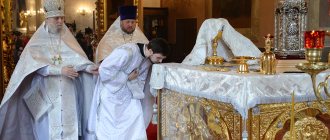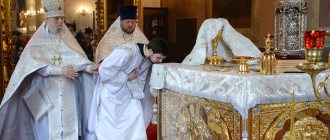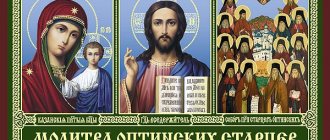Prayers in Church Slavonic
Reading a prayer in the language in which it has been read for many centuries in a row returns a Christian to the origins of the true Faith. In order to read morning and evening prayers in Church Slavonic, you need special concentration and thoughtfulness. By looking through the texts of ancient prayers every day, you begin to understand all the richness and wisdom of your native language.
Features of the prayer rule
A Christian who begins to read prayers will not immediately be able to enter into a prayer rhythm. To read prayers in Church Slavonic, you need skill and understanding of the text. A confessor can help with this. But without the sincere interest of the person praying, without his ardent faith, it is difficult to achieve spiritual grace from prayer. So that the soul does not fall out of Orthodox life, so that sinful thoughts do not bother a person immediately after waking up and before going to bed, one must not forget about the prayer ritual.
By thoughtfully and leisurely reading prayers in the Old Church Slavonic language, we become familiar not only with the image of the Creator, but also comprehend our native culture and history.
Sacred Language of the Church
So, Church Slavonic returned to its original and main function - use in divine services and prayers. The Church does not abandon it, considering it a spiritual treasure, a sacred instrument of communication with God and knowledge of His Word. This language provided magnificent examples of church hymnography and was sanctified by thousands of years of use in worship. It has become an integral part of the Russian Orthodox tradition and is of great importance for understanding the entire Russian culture. Hegumen Agafangel (Gagua) speaks about prayers in Church Slavonic:
“Liturgical texts are masterpieces of sacred poetry of a special type and order. Orthodox church services are called poeticized, iconographic, singing theology.”
The Church continues to address God in the Church Slavonic language and calls believers to do so. This language is incomparably more poetic and sublime than modern Russian. Only a language created within and for the Church is capable of so subtly conveying the relationship between the Creator and His creation and describing deep spiritual concepts. Priest Andrei Chizhenko notes that the Church Slavonic language, like icons, candles, censer with incense, is characterized by “transmundaneity”, “separation” from everything familiar in everyday life:
“This is an exclusively liturgical language, not used in everyday communication. It’s like our verbal “incense,” which we put into the censer of our hearts, praying and censing to the Almighty God.”
Texts of prayers in Church Slavonic
In the name of the Father, and the Son, and the Holy Spirit. Amen.
Publican's Prayer
God, be merciful to me, a sinner. (Bow)
Initial prayer
Lord Jesus Christ, Son of God, prayers for the sake of Your Most Pure Mother and all the saints, have mercy on us. Amen. Glory to Thee, our God, glory to Thee.
Prayer to the Holy Spirit
Heavenly King, Comforter, Soul of truth, Who is everywhere and fulfills everything, Treasure of good things and Giver of life, come and dwell in us, and cleanse us from all filth, and save, O Good One, souls ours.
Trisagion Prayer
Holy God, Holy Mighty, Holy Immortal, have mercy on us. (Read three times, with the sign of the cross and a bow from the waist.) Glory to the Father and the Son and the Holy Spirit, now and ever and unto the ages of ages. Amen.
Prayer to the Most Holy Trinity
Most Holy Trinity, have mercy on us; Lord, cleanse our sins; Master, forgive our iniquities; Holy One, visit and heal our infirmities, for Thy name's sake.
Glory to the Father and the Son and the Holy Spirit, now and ever and unto ages of ages. Amen.
Lord's Prayer
Our Father, who art in heaven! Hallowed be Thy name, Thy kingdom come, Thy will be done, as it is in heaven and on earth. Give us this day our daily bread; and forgive us our debts, just as we forgive our debtors; and do not lead us into temptation, but deliver us from the evil one.
Prayer Creed
I believe in one God, the Father, Almighty, Creator of heaven and earth, visible to all and invisible. And in one Lord Jesus Christ, the Son of God, the only begotten, who was born of the Father before all ages; Light from Light, true God from true God, begotten, uncreated, consubstantial with the Father, to whom all things were. For our sake, man and our salvation, who came down from heaven and became incarnate from the Holy Spirit and the Virgin Mary and became human. Crucified for us under Pontius Pilate, and suffered and was buried. And he rose again on the third day according to the Scriptures. And ascended into heaven, and sits at the right hand of the Father. And the one who is to come will judge with glory the living and the dead, His Kingdom will have no end. And in the Holy Spirit, the Lord, the Life-Giving One, who proceeds from the Father, who is with the Father and the Son, we are worshiped and glorified, who spoke the prophets. Into one Holy, Catholic and Apostolic Church. I confess one baptism for the remission of sins. I hope for the resurrection of the dead and the life of the next century. Amen.
Song of the Blessed Virgin Mary
Virgin Mary, Rejoice, O Blessed Mary, the Lord is with You; Blessed are You among women and blessed is the fruit of Your womb, for You have given birth to the Savior of our souls.
Source: https://omolitvah.ru/molitvy/molitvy-na-tserkovnoslavyanskom-yazyke/
Prayer “Holy God”: analysis
The essence of this prayer is an appeal to Him glorifying God. To adequately understand the content of the text, it is necessary to “split” it into several elements. For the most part, they go back to the Holy Scriptures. Thus, the threefold appeal “Holy” is an angelic praise that the prophet Isaiah heard during a miraculous vision. The Old Testament righteous man was privileged to see God himself seated on the throne surrounded by heavenly powers who sang:
“Holy, holy, holy is the Lord of hosts [one of the names-titles of God]! The whole earth is full of His glory!” (Isa.6:3)
By calling God Holy, Christians point to His infinite greatness and absolute moral perfection. In Orthodoxy, the concept of “holy” means purity, righteousness, belonging to God, isolation from the rest of the sinful world.
“God”, “Mighty” and “Immortal” are names of the Persons of the Holy Trinity borrowed from the Holy Scriptures.
The Father is called God as the highest Principle, from Whom the Son is born and the Holy Spirit proceeds.
The Son is called Mighty, that is, All-Powerful. After all, He defeated evil and death and became the Savior of all mankind.
The Holy Spirit is called Immortal because He is Eternal and is the source of Eternal life for people.
Of course, all these properties of the Divine hypostases apply to each Person of the Most Holy Trinity and are “interchangeable.” Saint John of Damascus explains:
“Holy God - we attribute this to the Father, without however appropriating to Him the name of God alone; but we know that both the Son and the Holy Spirit are God. We add the mighty Holy One to the Son, without taking away the power from the Father and the Holy Spirit. We attribute the Holy Immortal to the Holy Spirit, but we do not deprive the Father and the Son of the immortality” (“An Accurate Statement of the Orthodox Faith”).
That is why each of Them is called “Saints” in prayer, because they are all equally worthy of Divine honor and glory.
The prayer ends with the pleading words “have mercy on us.” Despite the enumeration of the Persons of the Holy Trinity, the verb in the petition is presented in the singular. After all, the Father, Son and Holy Spirit are not separate deities, but hypostases of the One God.
Prayers in Church Slavonic with translation
Viewing and reading prayers in Church Slavonic are very aesthetic in meaning and very useful when studying it. By looking through these short liturgical texts every day, you will quickly and in a relaxed manner get used to the basic words and letters of this language, which is a treasury of the Russian spirit and a bridge in time to the most real and truly Russian origins.
In the name of the Father, and the Son, and the Holy Spirit. Amen.
Publican's Prayer
God, be merciful to me, a sinner. (Bow)
Initial prayer
Through the prayers of the saints, our fathers, Lord Jesus Christ, our God, have mercy on us. Amen.
Prayer to the Holy Spirit
Heavenly King, Comforter, Soul of truth, Who is everywhere and fulfills everything, Treasure of good things and Giver of life, come and dwell in us, and cleanse us from all filth, and save, O Good One, souls ours.
Trisagion
Holy God, Holy Mighty, Holy Immortal, have mercy on us. Glory to the Father and the Son and the Holy Spirit, now and ever and unto ages of ages.
Prayer to the Holy Trinity
Most Holy Trinity, have mercy on us; Lord, cleanse our sins; Master, forgive our iniquities; Holy One, visit and heal our infirmities, for Thy name's sake. Lord have mercy. Glory to the Father and the Son and the Holy Spirit, now and ever and unto ages of ages.
Lord's Prayer
Our Father, who art in Heaven, hallowed be Your name, Your kingdom come, Your will be done, as it is in Heaven and on earth. Give us this day our daily bread; and forgive us our debts, just as we forgive our debtors; and do not lead us into temptation, but deliver us from the evil one.
Symbol of faith
- I believe in one God, the Father Almighty, Creator of heaven and earth, visible to all and invisible. mp3
- And in one Lord Jesus Christ, the Son of God, the only begotten, who was born of the Father before all ages. Light from Light, true God from true God, begotten, uncreated, consubstantial with the Father, to whom all things were. mp3
- For our sake, man and our salvation, who came down from heaven and became incarnate from the Holy Spirit and the Virgin Mary and became human. mp3
- Crucified for us under Pontius Pilate, and suffered and was buried. mp3
- And he rose again on the third day according to the Scriptures. mp3
- And ascended into Heaven, and sits at the right hand of the Father. mp3
- And the one who is to come will judge with glory the living and the dead, His Kingdom will have no end. mp3
- And in the Holy Spirit, the Lord, the Life-Giving One, who proceeds from the Father, who is with the Father and the Son, we are worshiped and glorified, who spoke the prophets. mp3
- Into one Holy, Catholic and Apostolic Church. mp3
- I confess one baptism for the remission of sins. mp3
- Tea of the resurrection of the dead, mp3
- and the life of the next century. Amen. mp3
Hymn to the Most Holy Theotokos
Virgin Mary, Rejoice, O Blessed Mary, the Lord is with You; Blessed are You among women and blessed is the fruit of Your womb, for You have given birth to the Savior of our souls.
Source: https://iamruss.ru/molitvy-na-tserkovnoslavyanskom-yazyke-s-perevodom/
A little history
Two brothers, Saints Cyril and Methodius, actively took part in the process of developing the liturgical language of worship. They were residents of the city of Thessaloniki (the modern Greek city of Thessaloniki), so Greek had a great influence on the formation of the Church Slavic language.
Despite numerous disputes about in which language the Divine Liturgy is more understandable, one thing is indisputable for prayer - the purity of the Church Slavonic language.
Saints Cyril and Methodius
It is obvious that it should be the main language in the life of the Church. And his lack of understanding only testifies to our ignorance and lack of education. Everything is incomprehensible to us until we begin to study this or that issue.
Now everyone has access to textbooks, Internet resources, and Orthodox courses to fill knowledge gaps. Moreover, for the laity there is no disagreement: read the morning prayers in Church Slavonic or in Russian.
Slavic prayers
Slavic prayers are comparable to a strong amulet. They can help in a variety of endeavors and matters. It is noteworthy that in ancient times, people turned to their ancient deities in prayer requests. After the advent of Christianity, the meaning of the texts of Slavic prayers did not change, but in their prayer appeals, believing Slavs began to turn to God the Father, Jesus Christ, the Most Holy Theotokos and other Saints.
For Slavic prayers to be effective, they should be read in a positive mood, and there should be no evil present in the soul.
The main commandments of the ancient Slavs when reading prayers are as follows:
- To honor sacredly means to recognize the power of the bright sides of life.
- To honor - translated from the Old Slavonic "CHI" - is the energy of life, and the word "thief" means "to appropriate." The general interpretation is to receive light power from the Gods and fill your own soul with it.
- Praise - in prayers the Gods are glorified, but their power is not used to solve their own problems.
- To live according to conscience - “SO” in the Old Slavonic language meant joint good news. This meant that you should not do to others what you do not wish for yourself.
- Living in harmony with the surrounding nature made it possible to find life harmony in accordance with natural vibrations.
In ancient times, the Slavs prayed at temples. This ancient pagan temple, which was always located behind an equipped altar, used to install various sacred objects. In these places, not only prayers were offered to the Gods, but also rituals were performed by priests.
Today, an improvised “temple” can be arranged in your own apartment on a separate table. To do this, you need to choose a place for the altar and place images of the deity on it. It is best to carve it out of wood with your own hands. This will allow you to fill the idol with your energy.
When equipping a place for offering Slavic prayers, the following requirements must be met:
- The created deity should be placed on a piece of new fabric, and a small natural stone should be placed next to it.
- Provide a place to place candles and incense.
- Place the ritual dish and cup.
If you live in a private house, then it is recommended to offer Slavic prayers in nature. For example, to do this you can go to a tree. It is also recommended to travel outside the city to pray to the ancient Slavic gods. In this case, the best place is considered to be a spring.
Slavic prayers in Church Slavonic
Slavic prayers are usually read in Old Church Slavonic. But for modern people it can be very difficult to understand their meaning in this case. Therefore, it is allowed to recite prayer texts translated into Russian.
More important are the basic rules that must be followed when reading Slavic prayers:
- The texts of ancient appeals to the Slavic gods are pronounced in a whisper, but very clearly.
- You can only pray if you are healthy and in a good mood, otherwise your prayers will not be heard.
- There must be faith in the soul that Slavic prayers are effective and contribute to the harmonization of life.
Read morning prayers
The most famous morning prayer of the ancient Slavs is considered to be the appeal to Dazhdbog.
It sounds in modern Russian as follows:
Such a prayer should be read at the moment of sunrise, and one must always look to the east.
The Slavs also often read morning praise.
Its text goes like this:
Text of evening prayers
The list of Slavic prayers also includes a special prayer that is recommended to be read in the evening hour.
Also often before going to bed, prayers were read for one’s family. Such praise might sound like this:
Church Slavonic language
Why does an Orthodox Christian need a prayer book in Church Slavonic? It is necessary to understand what a prayer book is and what is the significance of the Church Slavonic language in Russian Orthodoxy.
Church Slavonic is the ancient traditional language of worship in the Orthodox countries of Eastern Europe. It is based on the Old Church Slavonic language, the writing system of which was developed by the holy brothers Cyril and Methodius in the 9th century. These Byzantine preachers created an alphabet and writing for the Christian education of pagan Slavic tribes. This was necessary to create translations of the Bible and liturgical books. At that time, the Slavic peoples did not yet have their own written language.
Orthodox prayer
The Old Church Slavonic language was largely based on one of the ancient Bulgarian dialects, well known to Cyril and Methodius. Slavic dialects were widely used in northern Greece, where the brothers were born. Also, the new language absorbed elements of the linguistics of the Greek sacred books.
Quite quickly, the use of Old Church Slavonic spread beyond the boundaries of the Church. For many centuries it became literary and was used for teaching literacy, developing and simplifying along the way. Only in the 19th century was the language supplanted from almost all spheres of life by the Russian literary language. The latter was significantly enriched precisely thanks to Church Slavonic.
Ancient Slavic prayers to the gods
When they talk about ancient Slavic prayers of the Slavs, they mean traditional ritual words that the Slavs used to communicate with Higher powers. The word “prayer” was not present in Old Church Slavonic vocabulary. This is due to the fact that the Slavs glorified their Gods and... Unlike Christians, they never asked them for anything. That is why the Slavs called appeals to God “glorification.”
Glorifications or appeals to the Higher Powers have always been a mandatory attribute of all major ritual holidays. In addition, every day the ancient Slavs read morning and evening praises; such prayers were offered before meals, before traveling and before starting any business. But it should be understood that ancient Slavic prayers were not canon, turning to God was not considered an obligatory event, it was necessary to do this only when the desire arose. For example, if a person wanted to praise God for a successful day, then he did it. Very often praises were offered to Perun for his victory over his enemies.
Ancient Slavic prayers are very diverse. It is important to choose the right prayer address. The words must be pronounced very sincerely and it is not at all necessary to follow the existing texts. It is allowed to replace both individual words and individual phrases in your own way. It is important that prayer comes from the depths of the soul.
There is no such thing as a “main ancient Slavic prayer.” The prayers of the ancient people are distinguished by their individuality. In order to understand how ancient Slavic prayers were read, you need to get acquainted with the folklore and ethnography of the Slavs.










